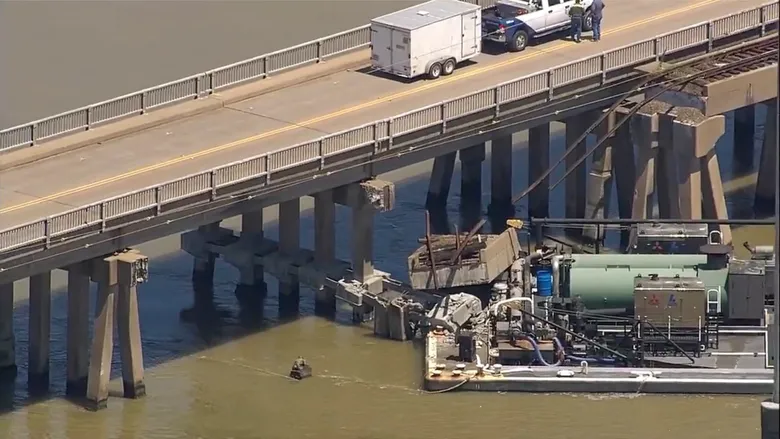A barge collision at the bridge connecting Pelican Island to Galveston, Texas, triggered an oil spill and forced road closures, officials disclosed.
The incident occurred around 10 a.m. local time when a barge, detached from a tugboat, struck the bridge’s pilings, informed Judge Mark Henry, Galveston County Emergency Management Director. While power outages briefly affected the island, secondary power was restored by 1 p.m. No casualties were reported, but two crew members were rescued after either being thrown off the barge due to the impact or jumping to evade concrete, Henry mentioned. Footage depicted a segment of the bridge’s railway collapsing onto the barge.
While traffic exiting the island was permitted, the bridge remained closed to vehicular traffic pending a final assessment after containing the oil leak and relocating the barge. Emergency responses involved city officials, Texas A&M University at Galveston, state agencies, Galveston fire and police departments, the U.S. Coast Guard, and Texas Department of Transportation.
The collision caused an oil spill, with vacuum gas oil seeping into the bay, officials confirmed. Martin Petroleum’s barge, with a 30,000-gallon capacity, triggered the spill, closing approximately 6.5 miles of the Intracoastal Waterway.
Residents on Pelican Island faced travel disruptions as the bridge closure limited access on and off the island, affecting around 200 residents. The U.S. Coast Guard and Texas Department of Transportation permitted island departure but restricted re-entry.
Texas A&M University at Galveston closed its campus for the remainder of Wednesday and Thursday, advising non-essential employees to vacate and others to prepare for alternative work arrangements. The university permitted on-campus residents to choose between staying or leaving but advised readiness for an indefinite off-campus stay.
The Pelican Island Causeway Bridge, opened in 1960, faced structural challenges, with a “Poor” rating from the Federal Highway Administration. Plans for replacement were in motion, aiming to commence construction in 2025 at an estimated cost of $194 million.
This collision adds to concerns over U.S. infrastructure integrity following the Francis Scott Key Bridge collapse in Baltimore and Interstate 95’s closure in Connecticut after a tanker crash and fire.








